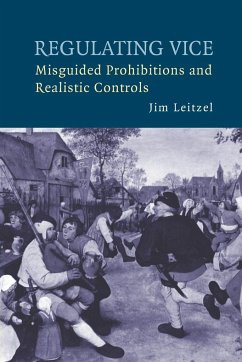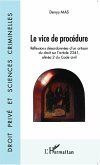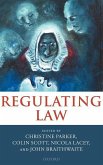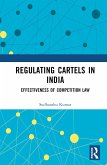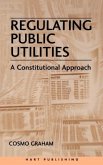Regulating Vice provides a new, interdisciplinary lens for examining vice policy.
Regulating Vice provides a new, interdisciplinary lens for examining vice policy, and focuses that lens on traditional vices such as alcohol, nicotine, drugs, gambling, and commercial sex. Regulating Vice argues that public policies toward addictive activities should work well across a broad array of circumstances, including situations in which all participants are fully informed and completely rational, and other situations in which vice-related choices are marked by self-control lapses or irrationality. This precept rules out prohibitions of most private adult vice, and also rules out unfettered access to substances such as alcohol, tobacco, and cocaine. Sin taxes, advertising restrictions, buyer and seller licensing, and treatment subsidies are all potentially legitimate components of balanced vice policies. Regulating Vice brings a sophisticated and rigorous analysis to vice control issues, an analysis that applies to prostitution as well as drugs, to tobacco as well as gambling, while remaining accessible to a broad social science audience.
Table of contents:
1. The harm principle; 2. Addiction: rational and otherwise; 3. The robustness principle; 4. Prohibition; 5. Taxation, licensing, and advertising controls; 6. Commercial sex; 7. The internet and vice; 8. Free trade and federalism; Conclusions; Appendix: Vice statistics; References.
Review quote:
'Leitzel focuses on public policy towards traditional vices such as alcohol, nicotine, drugs, gambling and commercial sex. He explains why vice prohibitions are generally misguided, and also describes the dangers of unfettered access to alcohol, cocaine or heroin.' Times Higher Educational Supplement
Hinweis: Dieser Artikel kann nur an eine deutsche Lieferadresse ausgeliefert werden.
Regulating Vice provides a new, interdisciplinary lens for examining vice policy, and focuses that lens on traditional vices such as alcohol, nicotine, drugs, gambling, and commercial sex. Regulating Vice argues that public policies toward addictive activities should work well across a broad array of circumstances, including situations in which all participants are fully informed and completely rational, and other situations in which vice-related choices are marked by self-control lapses or irrationality. This precept rules out prohibitions of most private adult vice, and also rules out unfettered access to substances such as alcohol, tobacco, and cocaine. Sin taxes, advertising restrictions, buyer and seller licensing, and treatment subsidies are all potentially legitimate components of balanced vice policies. Regulating Vice brings a sophisticated and rigorous analysis to vice control issues, an analysis that applies to prostitution as well as drugs, to tobacco as well as gambling, while remaining accessible to a broad social science audience.
Table of contents:
1. The harm principle; 2. Addiction: rational and otherwise; 3. The robustness principle; 4. Prohibition; 5. Taxation, licensing, and advertising controls; 6. Commercial sex; 7. The internet and vice; 8. Free trade and federalism; Conclusions; Appendix: Vice statistics; References.
Review quote:
'Leitzel focuses on public policy towards traditional vices such as alcohol, nicotine, drugs, gambling and commercial sex. He explains why vice prohibitions are generally misguided, and also describes the dangers of unfettered access to alcohol, cocaine or heroin.' Times Higher Educational Supplement
Hinweis: Dieser Artikel kann nur an eine deutsche Lieferadresse ausgeliefert werden.

